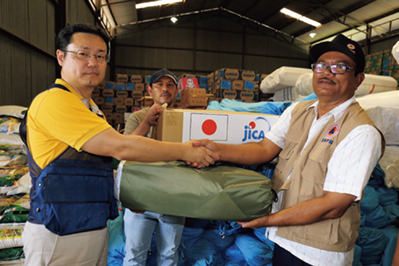(2) Emergency Humanitarian Assistance during Natural Disasters

Delivery of emergency relief goods from Japan for earthquake victims in Aceh, Indonesia, in December 2016 (Photo: Ahmad Ariska)
Japan stands ready for the immediate provision of emergency assistance in response to the request from the government of an affected country or an international organization when large-scale disasters occur overseas. In the aspect of personnel assistance, there are five types of Japan Disaster Relief (JDR) Teams that provide humanitarian assistance: (i) Search and Rescue Team to conduct search and rescue operations; (ii) Medical Team to provide medical assistance; (iii) Infectious Diseases Response Team to implement measures to combat infectious diseases; (iv) Expert Team to give technical advice or guidance on emergency response measures and recovery operations; and (v) Self-Defense Force Unit to undertake medical activities, transportation of aid supplies and personnel when it is deemed particularly necessary in responding to large-scale disasters. The five types of teams are dispatched individually or in combination.
Emergency relief goods are supplied as an in-kind assistance. Japan stockpiles tents, blankets, and other supplies needed for people affected in the immediate aftermath of a disaster, in four overseas warehouses. It enables Japan to quickly provide emergency relief goods to affected countries when disasters occur. In 2017, Japan provided emergency relief goods to Sri Lanka, Sierra Leone, Cuba, and Viet Nam, etc.
Moreover, for the purpose of providing relief to those who have been displaced or affected by natural hazards and/or conflicts overseas, Japan extends Emergency Grant Aid to the governments of affected countries as well as international organizations and other institutions that provide emergency assistance in areas affected by the disasters. In many cases, Japanese NGOs work as partners when these international organizations engage in actual emergency assistance.
Additionally, Japanese NGOs provide various forms of assistance to those affected by disasters in regions that government aid does not always reach, by utilizing ODA funds to meet their needs. Japan Platform (JPF) (see “C. Financial cooperation for NGO projects”), an emergency humanitarian aid organization established through the partnership and cooperation of NGOs, business communities and the Government of Japan, dispatches member NGOs to provide assistance to refugees, IDPs, or people affected by conflict or natural hazards.
•Collaboration with International Organizations
Japan cooperates with the Global Facility for Disaster Reduction and Recovery established in 2006 and managed by the World Bank. This Facility aims at supporting efforts to improve the ability for disaster risk reduction planning and post-disaster reconstruction in low- and middle-income countries that are vulnerable to natural hazards.
In addition, Japan is also supporting the ASEAN Coordinating Centre for Humanitarian Assistance on Disaster Management (AHA Centre) by providing support for information communication systems and dispatching personnel, as well as providing emergency relief goods and support for establishing a goods management and distribution system.
